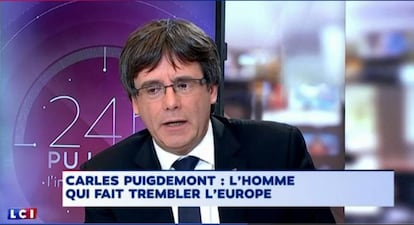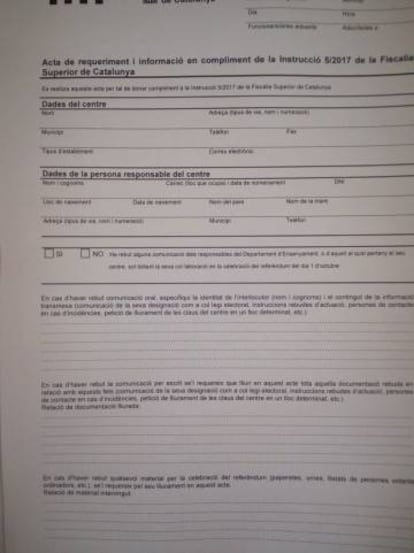Catalan public prosecutor orders police to take control of polling stations
Referendum preparations continue, but regional officials are now suggesting a period of talks before secession occurs

With five days to go before a planned independence referendum that has captured global attention, Catalan authorities are continuing to lay the groundwork for a vote that Spanish courts have suspended on the basis it is unconstitutional and illegal.
On Tuesday, acting on orders from the chief prosecutor in the region, the Catalan regional police, the Mossos d’Esquadra, began visiting the schools that are likely to serve as polling stations on Sunday, in order to identify and take details from school officials. Among the information they will be collecting is who is in charge at each education center, and whether they have received any instructions from the regional education department to take part in the planned October 1 vote.
The first step toward a referendum like Quebec’s or Scotland’s is to oust Rajoy from office
Pablo Echenique, Podemos
Officers have also been ordered to take control of the education centers and civic centers that are expected to serve as polling stations. With the buildings sealed off or guarded by police, the aim is to make the vote impossible. The public prosecutor is yet to announce when the regional police will take control of the buildings, but it is possible, according to sources from the the prosecutor’s office, that it will be on Friday evening at the end of the school day, thus avoiding the occupation of the sites by volunteers or activists.
Despite the escalating confrontation, new statements by Catalan officials suggest a possible change of scenario after October 1.
The Catalan government, which is run by a nationalist coalition called Junts pel Si (Together for Yes) with support from the small radical CUP party, has been pledging to declare independence unilaterally as soon as the referendum is held, if “Yes” wins and regardless of the turnout.

But on Monday night, Catalan premier Carles Puigdemont said on French television that if “Yes” wins on Sunday, he wants to open up a transitional period for talks with Spain and the European Union.
Asked by the interviewer on LCI whether this means that “you will not go ahead and declare Catalonia’s independence, but make a call for dialogue first,” Puigdemont answered affirmatively.
“Of course. We are committed to implementing the outcome, and if it is Catalonia’s will to be an independent country, Catalonia will begin its journey as an independent country. But above all, we want this process to be negotiated, agreed to, especially with Spain. It will be essential, on October 2, for the Spanish state to want to agree on how to handle this transition.”
The statement reflects how division over the benefits of a unilateral declaration of independence has reached Catalonia’s governing parties, which have little in common outside the referendum project.
Carles Campuzano, the parliamentary spokesman for PDeCAT – the larger of the partners that form Junts pel Si – said on Tuesday that such a declaration “does not show up” in his party’s platform, and that it is “absolutely ruled out” no matter what the outcome on October 1.
Catalan independence does not materialize in three days
Carles Campuzano, PDdeCat
“Catalan independence does not materialize in three days,” said Campuzano. Instead, the central and Catalan governments should open up talks about “the conditions that derive from” the outcome of the ballot. “This is what makes political, democratic and institutional sense.”
This view clashes with CUP, a small anti-capitalist party that wants immediate independence from Spain. The CUP’s support has been pivotal to Junts pel Si ever since the 2015 regional election, when the latter failed to secure a clear majority.
Spain’s leftist protest party, Podemos, on Monday defended an alternative route out of a major political crisis.
Podemos “does not share a unilateral declaration of independence in any case,” said Noelia Vera, adding that “it is also a mistake to storm printing presses and seize ballot papers – all that does is add fuel to the fire.”
Their solution: a negotiated referendum with legal guarantees. “The first step towards a referendum like Quebec’s or Scotland’s is to oust [Prime Minister Mariano] Rajoy from office,” said party organization secretary Pablo Echenique.
Former PM Felipe González admitted that the situation in Catalonia is what has worried him the most “in the last 40 years”
Felipe González, who was Spain’s longest-serving prime minister (1982-1996), on Tuesday admitted that the situation in Catalonia is what has worried him the most “in the last 40 years.”
The former Socialist leader, who took Spain into the European Economic Community, called it “a dramatic state crisis” and compared Catalonia with Venezuela, where President Nicolás Maduro lost the election and “invented” a parallel constituent assembly – alluding to the breakaway laws that were fast-tracked inside the Catalan parliament on September 6 and 7.
González said that he is open to reforms to Spanish legislation, and that he is convinced that a solution can be found “among democrats.”
English version by Simon Hunter and Susana Urra.
Tu suscripción se está usando en otro dispositivo
¿Quieres añadir otro usuario a tu suscripción?
Si continúas leyendo en este dispositivo, no se podrá leer en el otro.
FlechaTu suscripción se está usando en otro dispositivo y solo puedes acceder a EL PAÍS desde un dispositivo a la vez.
Si quieres compartir tu cuenta, cambia tu suscripción a la modalidad Premium, así podrás añadir otro usuario. Cada uno accederá con su propia cuenta de email, lo que os permitirá personalizar vuestra experiencia en EL PAÍS.
¿Tienes una suscripción de empresa? Accede aquí para contratar más cuentas.
En el caso de no saber quién está usando tu cuenta, te recomendamos cambiar tu contraseña aquí.
Si decides continuar compartiendo tu cuenta, este mensaje se mostrará en tu dispositivo y en el de la otra persona que está usando tu cuenta de forma indefinida, afectando a tu experiencia de lectura. Puedes consultar aquí los términos y condiciones de la suscripción digital.








































